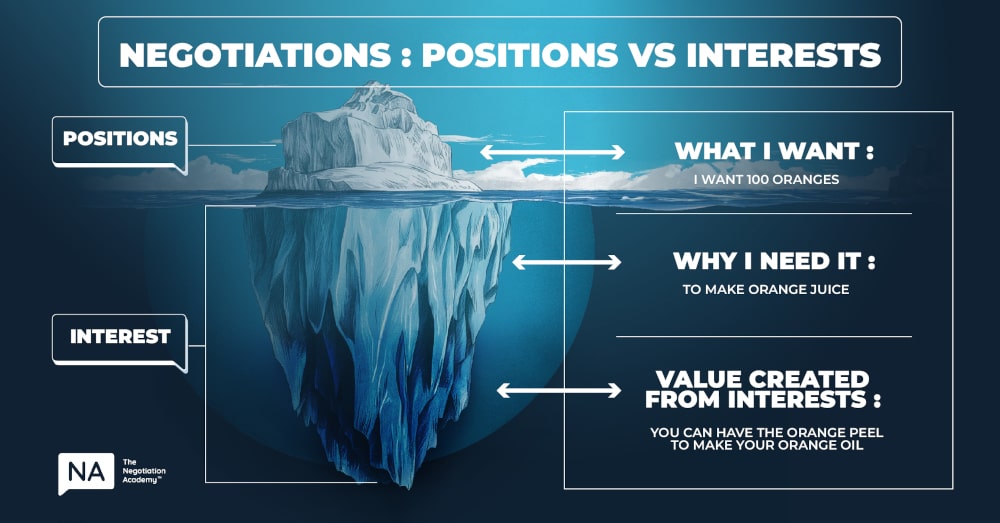
Picture a potential client walking through the door seeking your legal services to sue one of his rivals.
After he explains his case to you, you inform him that settling out of court makes more sense as fighting the case in court will take too long and be too expensive. He responds with this cliché:
“It’s not about the money; it’s about sending a message.”
What’s his desired position? To sue his opponent.
What is his interest here? Revenge.
Tough.
As negotiators, knowing your client’s interests and positions is key to preparing for any successful negotiation.
Starting Negotiations With Why:
How Finding Interests in Negotiation Creates Value
Finding out each other’s interests can reveal more value (or money) for both parties.
You might know this age-old example from Getting to Yes: Two sisters negotiate for the same orange and eventually agree to split the orange in half. This looks like a fair outcome, but if they asked each other what they wanted the orange for, both could have gotten more of what they needed.
A position refers to “What you want.” In this case, each sister wanted the whole orange.
Interests refer to “Why you want it.” In this example, one sister wanted to use the peel for a recipe while the other wanted to make orange juice. Had they known why each wanted the orange, one would have the whole peel and the other would have the whole orange’s worth of juice.

If negotiators only focus on positions, there’s a tendency to slip into a competitive mindset. That causes us to dig in and only focus on trying to get a larger slice of the pie. Position-focused negotiation could also lead to underlying interests not being fulfilled, unsatisfactory outcomes for both parties and possibly a breakdown in the relationship.
Interests tend to be easier to reconcile than positions, and focusing on interests provides more room to find win-win solutions. By uncovering what each party needs, like in the orange example, there could be ways to satisfy both parties’ true needs and create more value for both sides.
Finding Your Client’s Interest
When preparing for a negotiation, your clients will give you their position, but it’s up to you to figure out their interests. Without understanding their interests, you could face situations where getting them their desired position still leaves them unsatisfied if their true interests are still unmet.
While preparing for your negotiation, have a meeting with your key stakeholders to find out their positions, priorities, and requirements. During this discussion, focus on their motivations by asking them to explain the underlying needs or benefits of their positions.
This process could take some time, and regular check-ins throughout the negotiation process could help you better understand what your side is looking for.
Here are some questions, known as chunking questions, you can ask:
- “If you had [what you want], what would that do for you/your business?”
- “Can you tell me more about what we are hoping to achieve by [What they asked you for]” ?”
- “How is [what you want] helping you make things work/right?”
Finding Your Negotiation Counterparty’s Interest
There are 2 main types of negotiation: competitive negotiation and collaborative negotiation.
In a competitive negotiation, what matters is ‘more for me, less for you.’
But when we start with competitive negotiation right out the gate, we refuse to share or learn information. If our counterparty reciprocates competitively, you’ll end with a zero-sum game situation.
People tend to resist answering questions during negotiations if they view negotiation as a competition. When they think this way, they won’t answer questions for fear of being taken advantage of or giving too much away.
Collaborative negotiation, on the other hand, is about growing value together, so the focus is not on ‘less for you’ but ‘more for myself’ by making the pie bigger.
Moving towards collaborative negotiations and away from competitive negotiations requires us to share information strategically and get them to reciprocate. Here are some tips to do that:
Build trust first
If our counterparty doesn’t trust us, they’ll play their cards close to their chest. Reciprocity is key, and we won’t learn anything from them if we don’t share some information with them first.
To know what to share, we must shift our mindsets away from “share as little as possible” to “withhold only what’s necessary.”
Prepare and take small steps:
Preparation lets us know what information is key to our position and which ones we can share more freely. Knowing this prevents us from defaulting to competitive negotiation which could kill any value creation opportunities.
When negotiating with your counterparty, gradually build up sharing and be careful with what you’re giving away, especially if your counterparty is a competitor.
We’ll still need to focus on the outcomes of our decisions, so don’t give anything away without expecting anything in return.
Ask questions carefully:
Once you’ve gained their trust, you can then ask probing questions to uncover their interests. For example, if they state their position you can ask these questions to lead them towards discussing interests instead:
- “If you had what it is you want, how would that help you?”
- “How is that useful to you?”
You can also use open questions once you’ve built sufficient trust with them to uncover their interests:
- “What do you need to achieve?”
- “What is most important to you?”
- “What would it take for this to work for both of us?”
Here are other probing questions that you can also try:
Nudging probes: Saying things like “I see,” and “What happened after that?” can get people to open up and answer more thoroughly if they are initially resisting questions
Silence probe: Sometimes, choosing not to speak but using body language, like nodding, to show that you’re still listening could encourage them to speak more. They could end up giving you valuable information this way.
Information probe: This is a follow-up question that asks for more information regarding a response that seems to be incomplete. You can follow up some of their responses by asking “When you say you need more X, could you be more specific?”
Summary probe: This involves summarizing your counterpart’s responses so far. This can show them that you’ve been paying attention and could get them to elaborate further on what they’ve already shared.
Clearinghouse probe: This is a blanket question to let the counterparty provide more information about given issues. One example is “Is there anything else that we still need to cover about this deal?”
Understanding interests can transform negotiations, making outcomes more satisfactory for all parties involved.
However, there is a fine line to walk when using interest-based negotiation. We need to be strategic when handling both our clients and the counterparty so that we don’t slip into competitive bargaining too quickly or get taken advantage of during negotiations.
Want to learn more about using interests strategically or about negotiation? Join our live sessions or online courses at Negotiation Academy. Start improving your negotiation skills today!
Also, if you enjoyed this content, feel free to sign up for our free 10-week Email course on the fundamentals of Collaborative and Competitive Negotiation skills by clicking HERE.
At Negotiation Academy, we’re on a mission to make negotiation skills second nature to everyone because we believe that negotiation is one of the most influential skills for your career, life, and business.
google-site-verification: google59e88a3c63305baf.html



